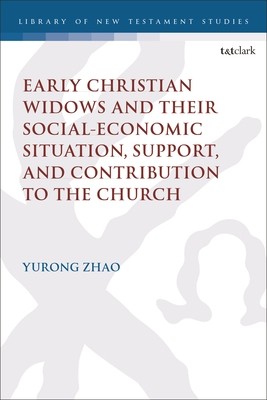
- We will send in 10–14 business days.
- Author: Rebekah Yurong Zhao
- Publisher: T&T Clark
- ISBN-10: 0567721353
- ISBN-13: 9780567721358
- Format: 15.6 x 23.4 x 1.6 cm, cietos vākos
- Language: English
- SAVE -10% with code: EXTRA
Early Christian Widows and Their Social-Economic Situation, Support, and Contribution to the Church (e-book) (used book) | bookbook.eu
Reviews
Description
In the first consideration of widows in early Christianity, Rebekah Yurong Zhao explores the social-economic situation of widows, their means of support, and their contributions to the church. Through literary analysis of three different genres of early Christian texts - narrative, instruction, and apologetic texts, Zhao argues that historical conclusions can be drawn, especially when set against the cultural backgrounds in both the Roman world and ancient Judaism.
By exploring the situation for widowed women in these cultures, and analysing significant texts from the first two centuries of the church - including 1 Timothy, the Shepherd of Hermas, Ignatius, Polycarp, Tertullian and the Apologists - Zhao seeks to answer three key questions: what status did widows hold in early Christian society, who precisely comprised their support network, and what contributions did they make to the church? Ultimately, this volume examines how support for widows became an iconic practice in early Christianity, whilst also dispelling the stereotype of the widow as merely a passive recipient of care.EXTRA 10 % discount with code: EXTRA
The promotion ends in 23d.19:19:15
The discount code is valid when purchasing from 10 €. Discounts do not stack.
- Author: Rebekah Yurong Zhao
- Publisher: T&T Clark
- ISBN-10: 0567721353
- ISBN-13: 9780567721358
- Format: 15.6 x 23.4 x 1.6 cm, cietos vākos
- Language: English English
In the first consideration of widows in early Christianity, Rebekah Yurong Zhao explores the social-economic situation of widows, their means of support, and their contributions to the church. Through literary analysis of three different genres of early Christian texts - narrative, instruction, and apologetic texts, Zhao argues that historical conclusions can be drawn, especially when set against the cultural backgrounds in both the Roman world and ancient Judaism.
By exploring the situation for widowed women in these cultures, and analysing significant texts from the first two centuries of the church - including 1 Timothy, the Shepherd of Hermas, Ignatius, Polycarp, Tertullian and the Apologists - Zhao seeks to answer three key questions: what status did widows hold in early Christian society, who precisely comprised their support network, and what contributions did they make to the church? Ultimately, this volume examines how support for widows became an iconic practice in early Christianity, whilst also dispelling the stereotype of the widow as merely a passive recipient of care.

Reviews